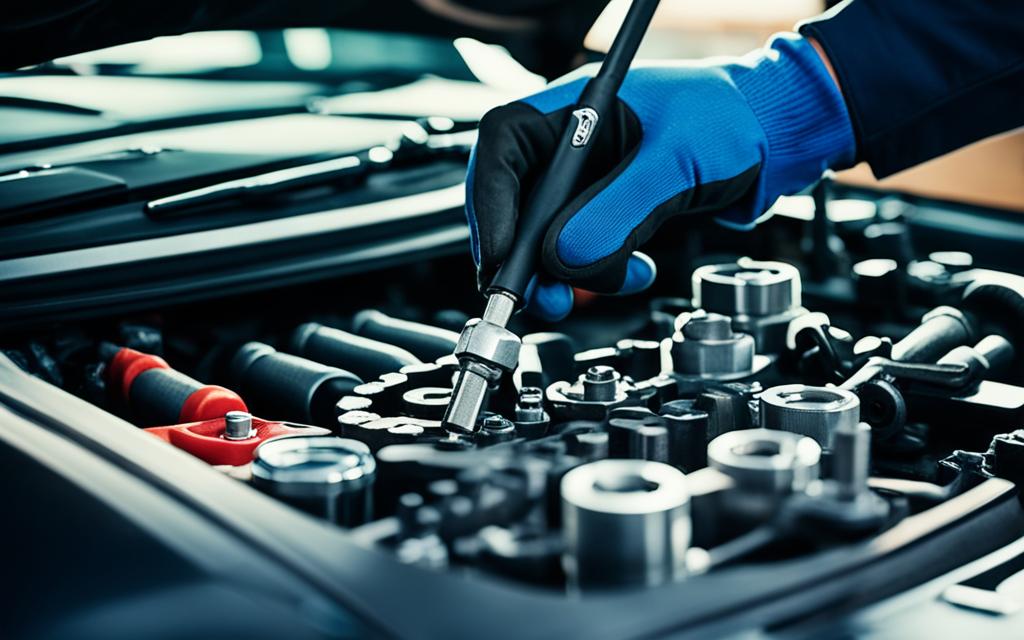Owning a high-end vehicle is a significant investment, and to ensure it continues to perform at its best, regular maintenance is crucial. In this article, I will provide expert tips and advice on how to maintain your high-end vehicle’s peak performance. These tips will cover various aspects of car maintenance, including oil changes, tire pressure, brake system care, and more. By following these tips, you can extend the lifespan of your vehicle and keep it performing at its highest level.
Key Takeaways:
- Regular maintenance is crucial for maintaining the peak performance of your high-end vehicle.
- Key areas of car maintenance include oil changes, tire pressure, and brake system care.
- Following expert tips can help extend the lifespan of your vehicle and keep it performing at its best.
- Maintaining a detailed record of your car’s service history is important for future maintenance needs and enhancing resale value.
- Investing in regular maintenance pays off in the long run by protecting your investment and enhancing your vehicle’s performance and reliability.
The Importance of Regular Oil Changes for Engine Longevity
Regular oil changes are crucial for the longevity and performance of your vehicle’s engine. Engine oil plays a vital role in lubricating moving parts, preventing friction, and carrying away heat. Over time, however, oil can become contaminated with dirt and debris, which can reduce its effectiveness in protecting your engine.
By following the recommended oil change intervals provided by the manufacturer, typically every 3,000 to 5,000 miles, you can ensure that your engine remains properly lubricated and protected. Regular oil changes prevent the buildup of harmful contaminants and help maintain the optimum performance of your engine.
DIY car maintenance enthusiasts may find it beneficial to create a car maintenance checklist that includes oil change intervals based on their driving habits and conditions. This can help ensure that oil changes are performed at appropriate intervals, extending the lifespan of the engine and preventing potential issues.
Maintaining a regular car maintenance schedule, including routine oil changes, is a proactive approach to preserving the health of your engine. Remember, a well-maintained engine not only provides better performance but also improves fuel efficiency and saves you from costly repairs in the long run.
“Regular oil changes prevent the buildup of harmful contaminants and help maintain the optimum performance of your engine.”
- Benefits of regular oil changes:
- Ensures proper lubrication of engine components
- Prevents friction and wear
- Carries away heat and keeps engine temperature in check
- Removes contaminants and sludge that can harm the engine
- Improves engine performance and fuel efficiency
- Extends the lifespan of the engine
Essential Car Maintenance Tips for Optimal Airflow and Performance
Proper airflow is crucial for maximizing the performance and efficiency of your vehicle. By following these car maintenance tips, you can ensure that your engine receives the right mixture of air and fuel, leading to improved fuel economy and engine performance.
Checking and Replacing Air Filters
To maintain optimal airflow, it’s essential to regularly check and replace your air filters. Air filters prevent dirt, dust, and debris from entering the engine, ensuring that clean air reaches the combustion chamber. Over time, air filters can become clogged, restricting airflow and reducing engine performance. Therefore, it’s recommended to inspect and replace your air filters according to the manufacturer’s guidelines or at least once every 12,000 to 15,000 miles.
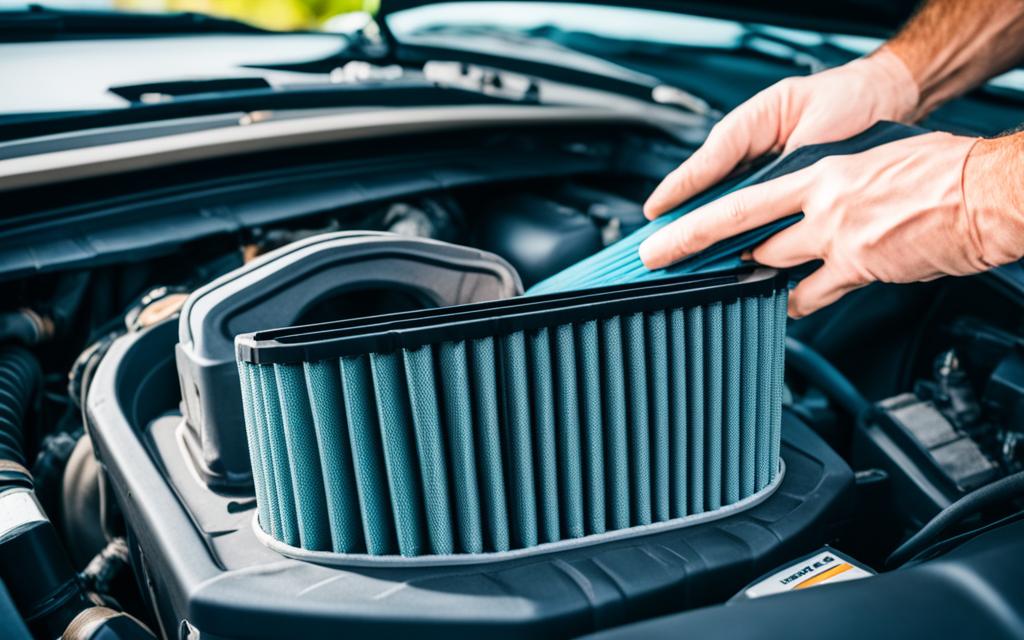
Benefits of a Clean Cooling System
In addition to air filters, a clean cooling system is essential for maintaining optimal engine temperature and preventing overheating. The cooling system helps regulate your engine’s temperature by dissipating heat. Over time, coolant can become contaminated with rust, scale, or debris, hindering its ability to effectively cool the engine. Regularly flushing and refilling the cooling system helps remove these contaminants and ensures that the coolant remains efficient. It’s recommended to flush and refill the cooling system according to the manufacturer’s recommendations or at least once every two years.
Accurate Tire Pressure: A Key to Fuel Efficiency and Safety
Maintaining accurate tire pressure is crucial for both fuel efficiency and safety. By regularly checking your tire pressure and ensuring it is at the recommended levels, you can reduce the risk of tire blowouts and improve fuel efficiency. Improperly inflated tires can also affect your vehicle’s handling, making it more difficult to steer and control.
Monthly Tire Pressure Checks
To maintain accurate tire pressure, it is recommended to perform monthly tire pressure checks. This simple task can be easily done at home or at a gas station with a tire pressure gauge. Refer to your vehicle’s owner manual or the decal located on the driver’s side door jamb for the recommended tire pressure. If the tire pressure is too low, use an air compressor to inflate the tires. Conversely, if the pressure is too high, release some air until it reaches the recommended level.
The Effect of Tire Pressure on Vehicle Handling
Proper tire pressure plays a crucial role in vehicle handling. Underinflated tires can cause instability, reduced traction, and increase the chances of hydroplaning on wet surfaces. Overinflated tires, on the other hand, can decrease the contact area between the tire and road, negatively affecting grip and handling. By maintaining accurate tire pressure, you can ensure optimal handling and drive with confidence.
Tire Rotation and Alignment: Crucial for Even Wear
Tire rotation and alignment are crucial aspects of car maintenance that can help ensure even tire wear and prolong the lifespan of your tires. By regularly rotating your tires, you can distribute wear more evenly, preventing premature tire replacements and saving you money in the long run. Additionally, proper wheel alignment is essential for maintaining safety and handling. It ensures that your tires make solid contact with the road, improving traction and stability.
I recommend rotating your tires every 6,000 to 8,000 miles to maintain optimal wear patterns. You can also have your wheel alignment checked regularly to ensure that your tires are aligned correctly. By following these car servicing tips, you can extend the lifespan of your tires and enjoy a smoother and safer driving experience.
| Tire Rotation and Alignment Recommendations |
|---|
| Rotate tires every 6,000 to 8,000 miles |
| Have wheel alignment checked regularly |
| Ensure even tire wear |
| Improve safety and handling |
| Prolong tire lifespan |
Advanced Braking System Care for High-End Vehicles
When it comes to high-end vehicles, the braking system is a critical safety feature that requires special attention. Routine car maintenance is essential for maintaining the effectiveness of your braking system and ensuring optimal performance. In this section, I will discuss two key aspects of advanced braking system care: regular brake fluid checks and changes, and the importance of maintaining the brake pads and rotors.
Regular Brake Fluid Checks and Changes
Checking and changing the brake fluid in your high-end vehicle is an important part of vehicle maintenance. Brake fluid plays a crucial role in transmitting hydraulic pressure to the braking system, allowing you to stop safely and effectively. Over time, brake fluid can become contaminated with moisture and debris, reducing its performance and potentially causing brake failure.
To ensure the functionality and longevity of your braking system, it is recommended to check the brake fluid levels regularly, ideally during your routine car maintenance schedule. Additionally, the brake fluid should be replaced according to the manufacturer’s guidelines or as recommended by a professional technician. By conducting regular brake fluid checks and changes, you can maintain the effectiveness of your brakes and prevent costly repairs.
Importance of Maintaining the Brake Pads and Rotors
The brake pads and rotors are critical components of the braking system that require regular maintenance to ensure optimal performance. Worn brake pads can reduce stopping power and increase stopping distances, compromising the safety of your high-end vehicle.
During routine car maintenance, it is essential to inspect the brake pads and rotors for signs of wear or damage. If the brake pads are worn beyond the recommended thickness or the rotors are severely warped or grooved, they should be replaced to maintain the braking system’s effectiveness. Regular inspections, along with timely replacements if necessary, will help keep your braking system in optimal condition and contribute to your high-end vehicle’s overall performance and safety.
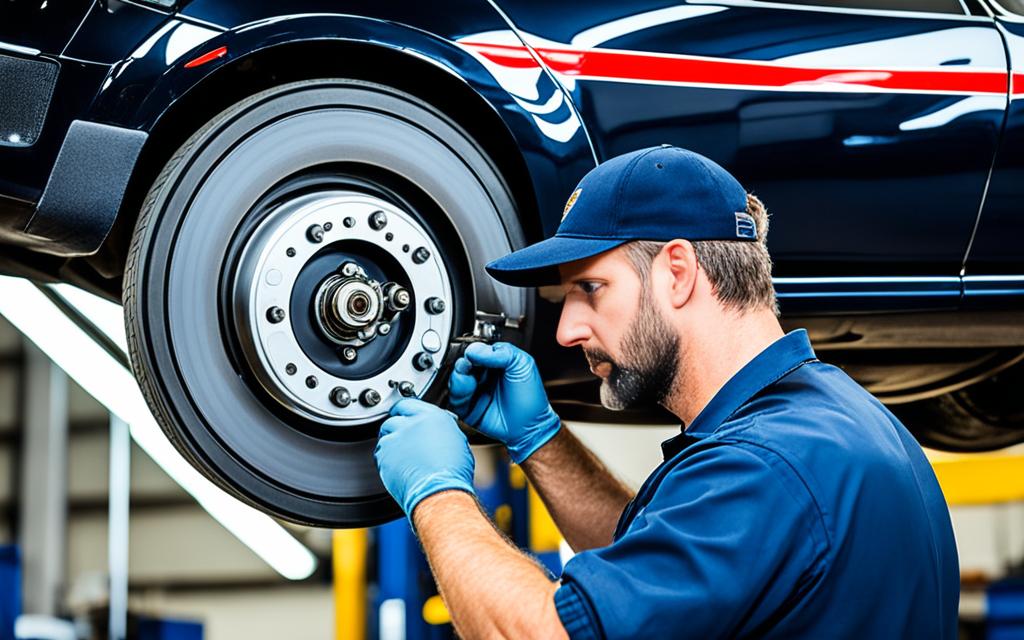
Regular brake fluid checks and changes are essential for maintaining the effectiveness of your braking system.
Maintaining Peak Performance with Belt and Hose Inspections
Belts and hoses are essential components that contribute to the proper functioning of your vehicle’s engine and other systems. They play a crucial role in ensuring that everything operates smoothly and efficiently. Over time, belts can become worn and hoses can develop cracks or leaks, which can lead to breakdowns and potential engine damage.
To prevent such issues, it’s important to regularly inspect your belts and hoses for signs of wear, cracks, or leaks. This will allow you to catch any problems early on and take preventive measures before they escalate.
An ideal time to have a thorough inspection of your belts and hoses is during your regular service or oil change. Your technician can assess their condition, check for any abnormalities, and recommend necessary replacements or repairs if needed.
By staying proactive and attentive to the health of your belts and hoses, you can ensure that your vehicle maintains its peak performance and reliability.
Regular inspections of belts and hoses can prevent breakdowns and potential engine damage.
Table: Signs of Belt and Hose Wear
| Belt | Signs of Wear |
|---|---|
| Timing Belt | Cracks, fraying, or reduced tension |
| Serpentine Belt | Visible wear, cracks, or splits on the belt surface |
Table: Signs of Hose Wear
| Hose | Signs of Wear |
|---|---|
| Radiator Hose | Cracks, bulges, or leaks |
| Heater Hose | Spongy or brittle texture, leaks |
Transmission Health: Ensuring Smooth Power Delivery
The transmission plays a critical role in transferring power from the engine to the wheels of your high-end vehicle. It is essential to maintain the health of your transmission to ensure smooth power delivery and prevent costly repairs. There are two key aspects of transmission maintenance that you should focus on: monitoring and maintaining transmission fluid levels and recognizing signs of transmission wear.
Monitoring and Maintaining Transmission Fluid
Transmission fluid is vital for the proper functioning of your vehicle’s transmission system. It lubricates the moving parts, reduces friction, and keeps the transmission cool. Regularly monitoring and maintaining the transmission fluid levels is essential. Low or contaminated fluid can lead to transmission damage and poor performance.
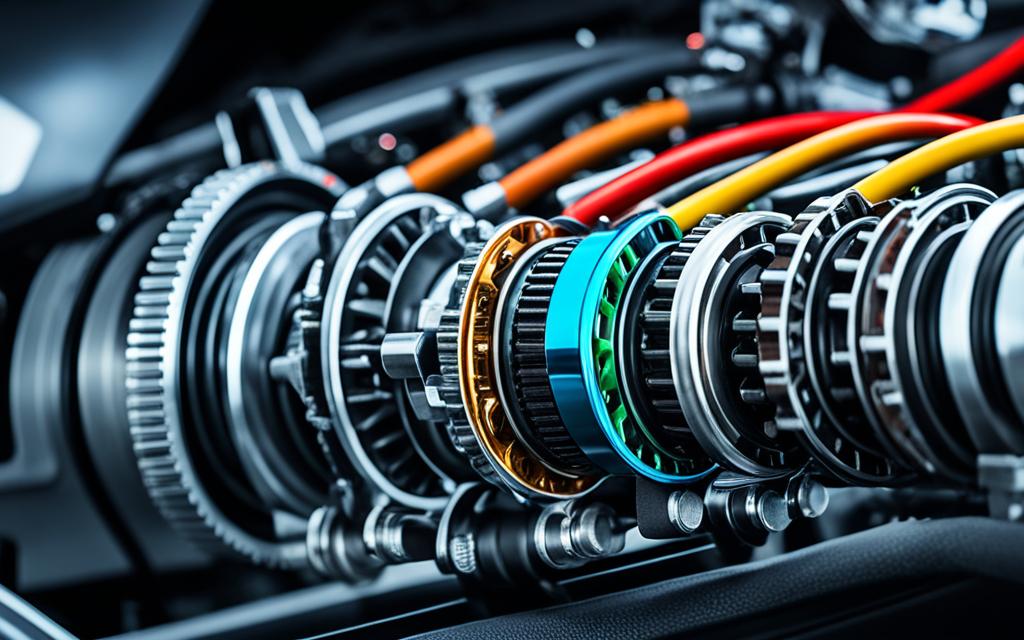
| Transmission Fluid Maintenance Tips |
|---|
| Check the transmission fluid regularly using the dipstick, following the manufacturer’s instructions. |
| If the fluid level is low, add the recommended type of transmission fluid to bring it to the proper level. |
| Ensure that the transmission fluid is clean and free from contaminants. If it appears dirty or has a burnt smell, it may need to be replaced. |
| Follow the manufacturer’s recommended transmission fluid change intervals to maintain optimal performance. |
Recognizing Signs of Transmission Wear
Being able to recognize the early signs of transmission wear can help you address potential issues before they become major problems. Pay close attention to how your transmission performs and watch out for the following warning signs:
- Slipping gears
- Delayed engagement or difficulty shifting
- Unusual noises, such as grinding or whining
- Burning smell
- Transmission fluid leaks
If you experience any of these signs, it is essential to have your transmission inspected by a qualified technician. Timely repairs can prevent further damage and extend the lifespan of your transmission.
Car Maintenance Tips to Enhance Your Vehicle’s Appearance and Lifespan
Keeping your vehicle in top condition goes beyond just the mechanical aspects. Regular car maintenance also includes taking care of its appearance. By following these car care tips, you can not only enhance your vehicle’s visual appeal but also prolong its lifespan.
The Protective Power of Regular Car Washing and Waxing
Regular car washing and waxing are essential for maintaining the exterior of your vehicle. Washing your car removes dirt, dust, and other debris that can accumulate on the surface, preventing potential damage to the paint. It also helps to remove corrosive substances like salt, which can cause rust and deterioration.
After washing, applying a layer of wax helps protect the paint and provides a barrier against UV rays, oxidation, and environmental contaminants. Waxing gives your vehicle a glossy finish and helps maintain its shine over time.
Here’s an image showcasing the protective power of regular car washing and waxing:
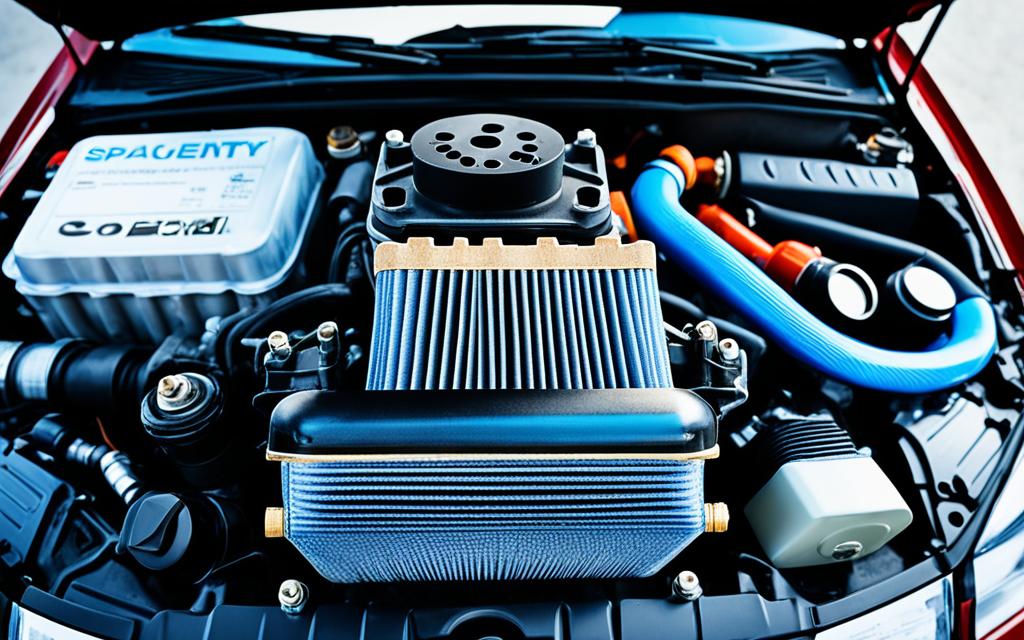
Understanding the Importance of Car Detailing
Car detailing takes car care to the next level by deep cleaning and restoring both the exterior and interior of your vehicle. It involves meticulous cleaning, polishing, and protecting every surface, ensuring a high level of cleanliness and aesthetics.
Exterior detailing involves cleaning and polishing the paint, removing surface imperfections, and restoring its shine. It also includes cleaning and treating the wheels, tires, and other exterior components. Interior detailing focuses on cleaning and refreshing the interior, including vacuuming, steam cleaning, and conditioning the upholstery, dashboard, and other surfaces.
Car detailing not only enhances the appearance of your vehicle but also helps to preserve its condition, preventing premature wear and tear. By regularly detailing your car, you can significantly improve its lifespan and maintain its value over time.
| Car Maintenance Tips to Enhance Your Vehicle’s Appearance and Lifespan |
|---|
| 1. Regular car washing |
| 2. Waxing for paint protection |
| 3. Understanding the importance of car detailing |
Attentive Driving and Early Issue Detection
When it comes to maintaining the performance and longevity of your high-end vehicle, attentive driving and early issue detection are paramount. By staying vigilant and proactive, you can identify potential problems before they escalate into costly repairs. Pay close attention to any unusual noises, vibrations, or changes in your vehicle’s performance, as these can be early warning signs of underlying issues.
When you notice any abnormalities, it’s crucial to address them promptly. Ignoring warning lights on your dashboard or dismissing minor concerns can lead to more significant problems down the line. Instead, consult with a professional technician who can diagnose and resolve the issue before it worsens.
By consistently practicing attentive driving and promptly addressing any potential issues, you can ensure the continued peak performance of your high-end vehicle and avoid costly repairs in the future.
Adhering to a Structured Car Maintenance Schedule
When it comes to maintaining your high-end vehicle, following a structured car maintenance schedule is crucial. By adhering to the manufacturer’s service guidelines, you ensure that your vehicle receives the necessary maintenance and inspections at the recommended intervals. This proactive approach to car maintenance helps keep your vehicle in optimal condition and prevents potential issues from escalating.
Benefits of Following the Manufacturer’s Service Guidelines
By following the manufacturer’s service guidelines, you can reap several benefits for your high-end vehicle:
- Optimal Performance: Regular maintenance helps your vehicle perform at its best, delivering smooth acceleration, efficient fuel consumption, and reliable handling.
- Extended Lifespan: Proper care and maintenance can prolong the lifespan of your vehicle, allowing you to enjoy its performance and luxury for years to come.
- Warranty Protection: Adhering to the manufacturer’s service guidelines is often a requirement to maintain your vehicle’s warranty coverage, providing added peace of mind.
- Resale Value: A well-maintained vehicle with a complete service history typically commands a higher resale value, ensuring a return on your investment.
Keeping a Detailed Record of Car Service History
In addition to following the manufacturer’s service guidelines, keeping a detailed record of your car’s service history is essential. This record should include all maintenance and repairs performed on the vehicle, along with the corresponding dates and mileage. By maintaining a comprehensive service history, you can:
- Track Maintenance Intervals: The service history allows you to easily track when certain maintenance tasks were last performed, helping you stay on top of scheduled service intervals.
- Avoid Overlapping Services: With a detailed record, you can avoid unnecessary or premature maintenance by ensuring that services are performed only when needed.
- Assist Future Maintenance: The service history serves as a valuable reference for future maintenance needs, providing vital information to technicians and helping diagnose potential problems.
- Enhance Resale Value: When it comes time to sell your high-end vehicle, a well-documented service history can increase buyer confidence and strengthen your negotiation position.
By adhering to a structured car maintenance schedule, following the manufacturer’s service guidelines, and keeping a detailed service history, you can optimize the performance, longevity, and value of your high-end vehicle.
Conclusion
When it comes to maintaining your high-end vehicle, diligent care and regular maintenance are key to reaping long-term benefits. By investing in a consistent maintenance routine and following the expert tips provided in this article, you can enjoy a high-performance, reliable, and long-lasting vehicle. Not only will regular maintenance improve the performance and lifespan of your high-end vehicle, but it will also help protect your investment and enhance its resale value.
By adhering to the manufacturer’s service guidelines and keeping a detailed record of your car’s service history, you can ensure that your vehicle receives the necessary maintenance and inspections at the recommended intervals. This structured approach to car maintenance will help keep your high-end vehicle in optimal condition and prevent major problems from arising.
Remember, regular maintenance is not only about immediate benefits, but it also secures long-term performance advantages. By investing in the care of your high-end vehicle, you are investing in its longevity and your own driving experience. So, take the time to prioritize regular maintenance and enjoy the many rewards it brings.

